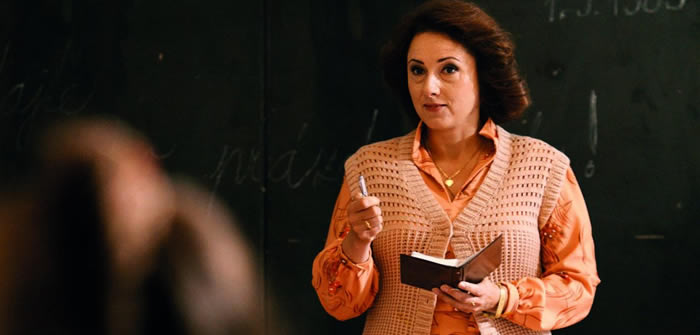At the start of the Slovak drama “The Teacher,” a well-dressed, middle-aged woman enters a classroom with a confident strut and a smile on her face. After a brief introduction, she asks the students to tell the class two specific bits of information: their name and their parents’ line of work.
The reason for this question becomes clear early in the film, a well-acted but rather dry and monotonous look at life in early ’80s Bratislava. The city was then in Czechoslovakia; post-Velvet Revolution, it is now part of Slovakia.
In 1983, the Communist Party still ruled. Its power was wielded in ways both obvious and subtle. One of the interesting elements of “The Teacher” is that it tells a small, tightly-focused story. The power player here is not a mighty political figure. Rather, she is a grade school teacher, albeit one who happens to lead the local Communist Party.
This is Maria Drazdechova (Zuzana Mauréry), a childless widow with a knack for using students and their parents for her own benefit.
“I rely on good people such as yourself,” she explains to her hairdresser after passing along some test tips for the hairdresser’s daughter.
When Drazdechova needs a cake delivered to a relative in Moscow, she asks a parent who works at the airport. Never mind the fact that he’s just an accountant, not a pilot. When her apartment needs cleaning, she relies on her students to clean. And when her toilet is acting up, the father of one of her students pays her a visit. That one, however, does not go according to plan.
The scenes of Drazdechova in the classroom and of her students’ home lives alternate with a meeting in which concerned parents argue for the teacher’s removal. These are among the finest scenes in the film — emotional, almost exhaustive point-counterpoint arguments.
Yet as the film lurches along, it becomes hard to maintain interest. There are memorable faces and characters, especially the youngest cast members. But the story of Drazdechova becomes less and less involving. The same is true of the parents’ pursuit of justice.
Things come to a reasonably satisfying conclusion, and the final scene is the film’s sharpest joke. As “The Teacher” draws to a close, the complex moral and ethical issues reminds us of other recent foreign language films — Cristian Mungiu’s “Graduation,” Asghar Farhadi’s “A Separation” and “The Salesman,” Andrey Zvyagintsev’s “Leviathan.
But “The Teacher” is not as strong as any of those films. It lacks the emotional power and the originality of these modern greats. Perhaps the film is simply too heavy-handed, too lacking in subtlety.
The director, Jan Hřebejk, is best known for 2000’s Oscar-nominated “Divided We Fall.” It lost to “Crouching Tiger, Hidden Dragon,” but brought Hřebejk his widest audience. “The Teacher” fails to reach the heights of “Divided,” yet it shares that film’s engagement with the concept of systematic corruption. And it, too, features a note-perfect lead performance.
In “The Teacher,” that lead is Zuzana Mauréry, an actress who will be unfamiliar to American audiences. She gives a towering performance — brutally honest and delightfully conniving. Mauréry makes the film worth watching.
Note that “The Teacher” is sharing screen time at the North Park Theatre this week with a sci-fi animated film from GKids, “Napping Princess.” Directed by anime veteran Kenji Kamiyama and set before the opening of the 2020 Tokyo Olympics, it’s the mysterious story of Japanese teenager with a very active imagination.
Source: Buffalo News

